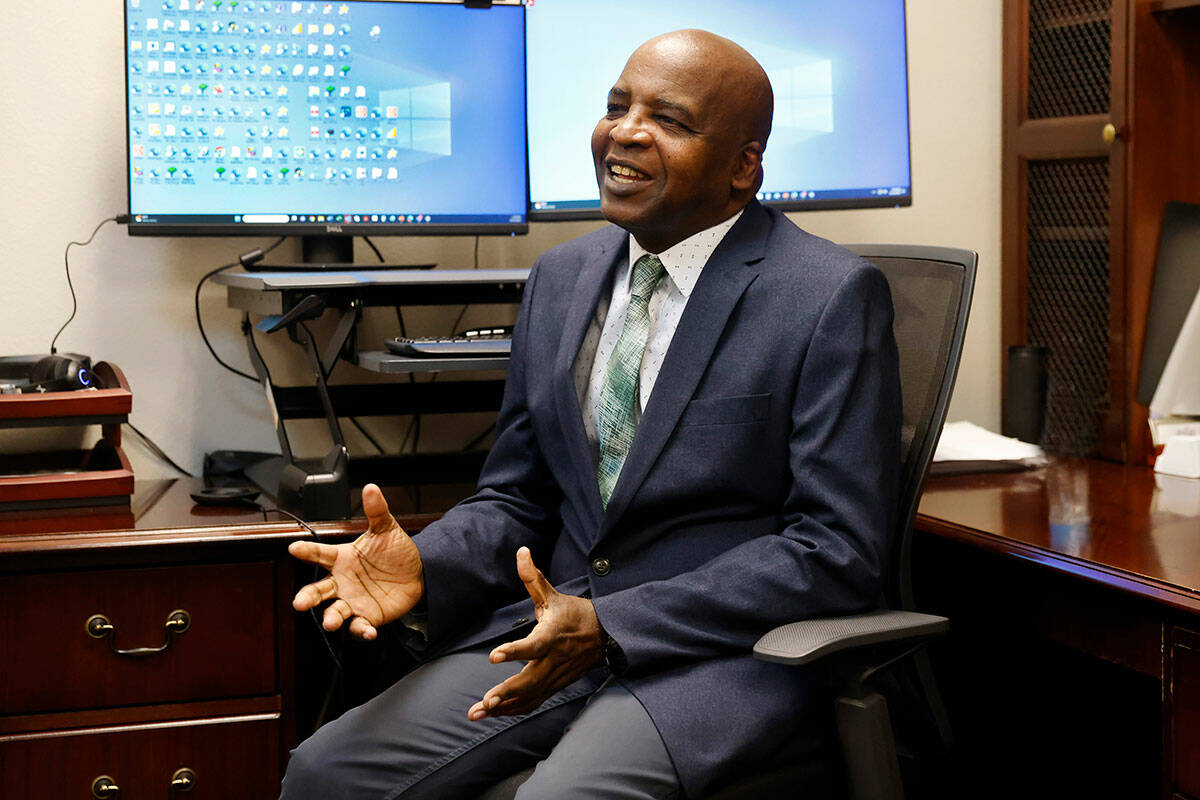Politics
Column: Trump called the latest 14th Amendment ruling a ‘victory.’ He couldn’t be more wrong
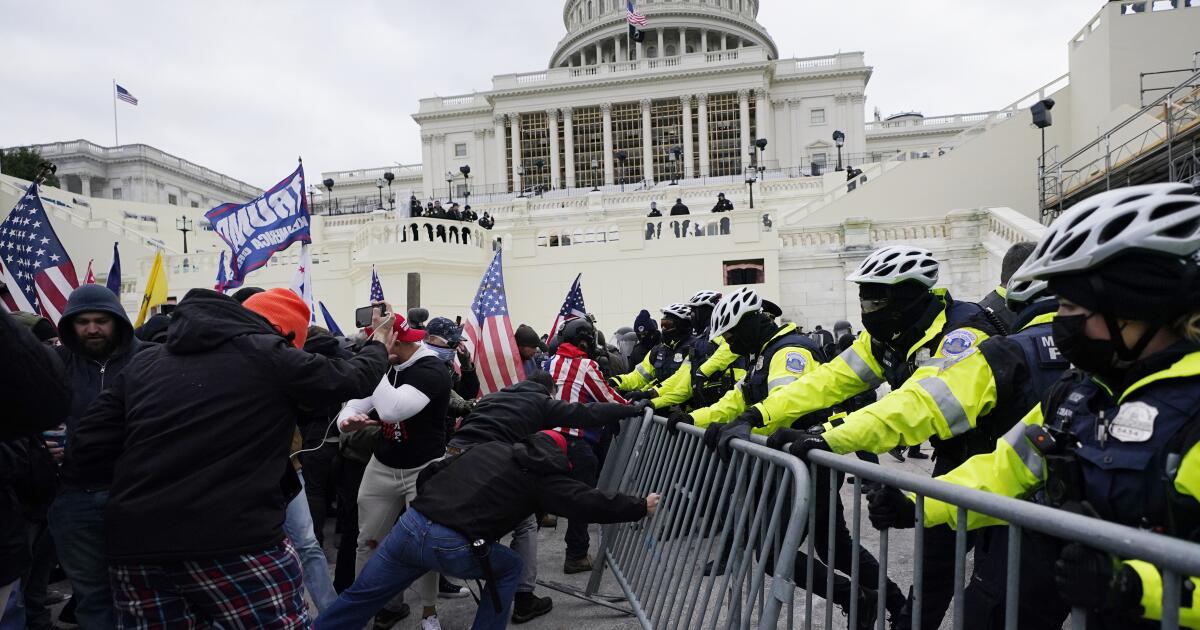
The latest opinion denying a challenge to Donald Trump’s eligibility to run for president has occasioned a lot of teeth-gnashing about how the court, in the words of Colorado’s secretary of state, gave Trump a “get-out-of-jail-free card for insurrection.” The frustration is understandable but shortsighted.
In fact, the opinion by Colorado District Judge Sarah B. Wallace is a giant step toward disqualifying Trump from the ballot on constitutional grounds.
The Colorado challenge is one of several brought under Section 3 of the 14th Amendment, which disqualifies officials who “have engaged in insurrection” against the United States from holding federal office. The provision gives rise to the argument that Trump is not qualified to run for president because of his role in the events of Jan. 6, 2021.
In the last few of its 102 pages, Wallace’s opinion concludes that the president is not “an officer of the United States” for the purposes of the amendment and is therefore not disqualified from the ballot. Trump hailed this as “a gigantic court victory.”
But the former president was either bluffing or being obtuse. In fact, the opinion goes nine-tenths of the way toward recognizing the challengers’ claim and disqualifying Trump before opting for a close and questionable textual reading on the officer question. The ruling is far more important for how it goes against Trump than for the court’s final change of direction.
Every other court that has taken up the 14th Amendment claim to date has shied away from adjudicating it on the merits, finding it was a political question or otherwise unsuited for determination by the courts. The Colorado judge, by contrast, held a week-long evidentiary hearing, taking testimony on the law and the facts.
Wallace’s resulting opinion works methodically through the evidence to determine that Trump did indeed engage in insurrection, which only a trial court can do. In the process, she rejected Trump’s 1st Amendment defense, finding that his intentional incitement of the Jan. 6 marauders overcame any free-speech claim.
The order that will be appealed to higher courts thus has nearly everything that would be needed to disqualify Trump from the ballot. Its final flinch on whether the president is an officer is a discrete question of textual interpretation that any appellate court could decide differently.
The challengers’ brief, in fact, treated the officer issue almost as an afterthought, though a subsequent Wall Street Journal op-ed by former Atty. Gen. Michael Mukasey brought new attention to the question. And the conclusion that the president is not an officer has drawn ferocious criticism from eminent scholars, including the conservative former appellate Judge J. Michael Luttig, who called it “unfathomable.”
However weak or strong the claim — I don’t think it’s as ridiculous as others contend — the important point is that higher courts will decide it as a question of law. They may well disagree with Wallace on that point while adopting her far more important finding that Trump engaged in insurrection.
It’s widely assumed that any appellate ruling disqualifying Trump from the ballot would prompt intervention by the U.S. Supreme Court, which would have the final say. And it’s hard to imagine that the Supreme Court could or would make the determination that Trump engaged in insurrection without a factual record to review. In that way, Wallace’s opinion sets what had been an empty table for the court.
Of course, appellate courts could agree with Wallace on the officer question or differ with her on other legal grounds. A higher court could, for example, reject Wallace’s definition of insurrection as “any public use of force or threat of force by a group of people to hinder or prevent the execution of law” — an expansive definition based on a historical analysis of the term’s meaning during Reconstruction, when the 14th Amendment was adopted. Higher courts could also hold that enforcement of Section 3 is a political question that only Congress can answer, though that would raise other questions about the states’ power to ensure candidates meet other basic qualifications for the ballot.
The bottom line, however, is that the Colorado opinion gives the challengers what they needed most — a determination that Trump engaged in insurrection — while raising legal questions that the higher courts would have had to answer in any case. It thereby breathes new life into a potential legal solution to the Trump nightmare that might otherwise have remained quixotic.
Harry Litman is the host of the “Talking Feds” podcast. @harrylitman

Politics
Trump has Christmas message to 'Radical Left Lunatics,' tells inmates Biden granted clemency to 'GO TO HELL!'

President-elect Trump dished out a fiery Christmas message on Wednesday in which he wished a “Merry Christmas” to “Radical Left Lunatics,” told the 37 prisoners whose death row sentences were recently commuted by President Biden to “GO TO HELL!,” and more.
“Merry Christmas to the Radical Left Lunatics, who are constantly trying to obstruct our Court System and our Elections, and are always going after the Great Citizens and Patriots of the United States but, in particular, their Political Opponent, ME. They know that their only chance of survival is getting pardons from a man who has absolutely no idea what he is doing,” Trump declared on Truth Social.
“Also, to the 37 most violent criminals, who killed, raped, and plundered like virtually no one before them, but were just given, incredibly, a pardon by Sleepy Joe Biden. I refuse to wish a Merry Christmas to those lucky “souls” but, instead, will say, GO TO HELL! We had the Greatest Election in the History of our Country, a bright light is now shining over the U.S.A. and, in 26 days, we will, MAKE AMERICA GREAT AGAIN. MERRY CHRISTMAS!” he added.
TRUMP AND BIDEN OFFER CHRISTMAS GREETINGS AS US APPROACHES TRANSFER OF POWER
President-elect Donald Trump smiles during Turning Point USA’s AmericaFest at the Phoenix Convention Center on Dec. 22, 2024 in Phoenix, Ariz. (Rebecca Noble/Getty Images)
Biden recently announced that he commuted the sentences of 37 prisoners on federal death row to life sentences without the potential for parole.
“Make no mistake: I condemn these murderers, grieve for the victims of their despicable acts, and ache for all the families who have suffered unimaginable and irreparable loss,” the president said in a statement, but noted that he is “more convinced than ever that we must stop the use of the death penalty at the federal level.”
TRUMP PLEDGES TO BRING BACK FEDERAL EXECUTIONS AFTER BIDEN COMMUTES DEATH SENTENCES FOR 37 INMATES
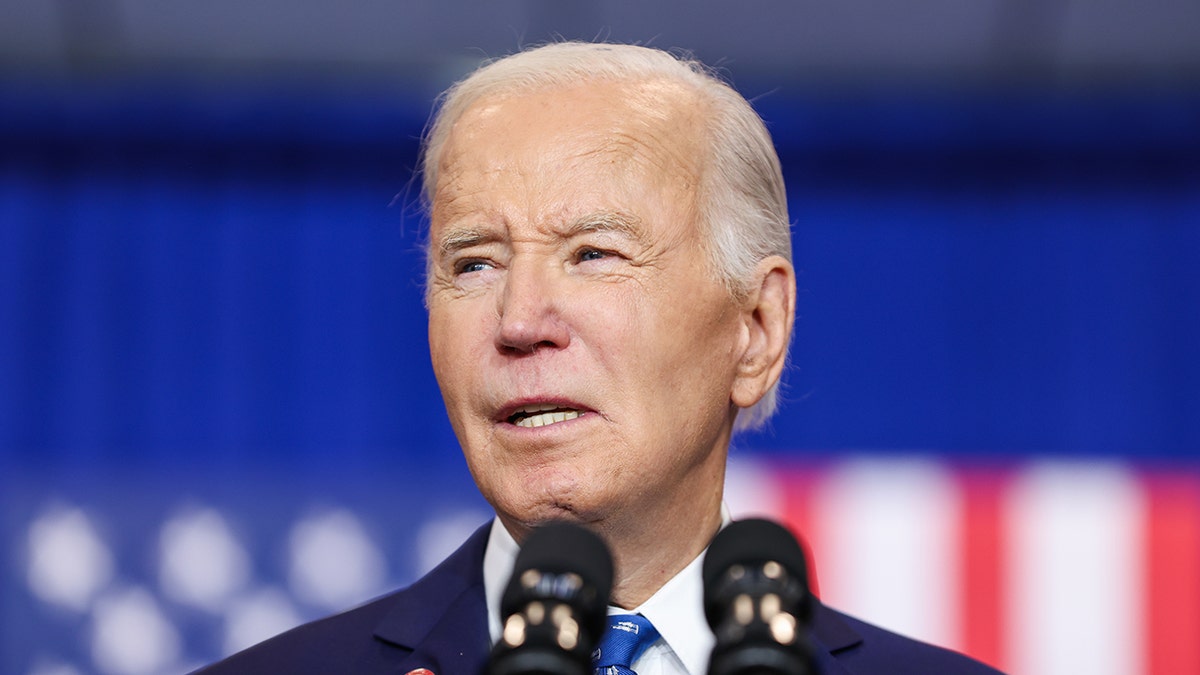
President Joe Biden speaks at the US Department of Labor in Washington, D.C., on Monday, Dec. 16, 2024. (Samuel Corum/Sipa/Bloomberg via Getty Images)
In a separate post, Trump declared, “Merry Christmas to all, including to the wonderful soldiers of China, who are lovingly, but illegally, operating the Panama Canal (where we lost 38,000 people in its building 110 years ago), always making certain that the United States puts in Billions of Dollars in ‘repair’ money, but will have absolutely nothing to say about ‘anything.’
He also discussed Canada, referring to Prime Minister Justin Trudeau as the “Governor” of America’s northern neighbor, while suggesting that Canadian businesses would boom if the nation became a U.S. state.
TRUMP FLOATS NHL LEGEND WAYNE GRETZKY AS CANADIAN PRIME MINISTER AMID TRUDEAU TURMOIL
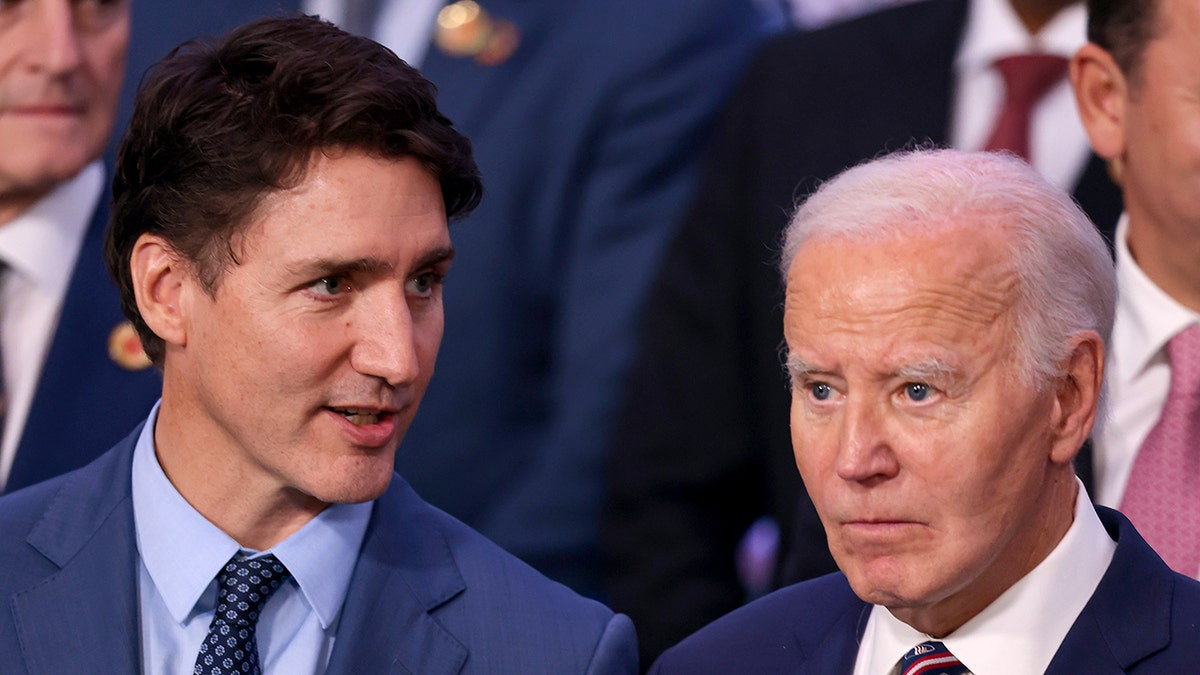
Justin Trudeuau, prime minister of Canada, and Joe Biden, president of the United States, talk as part of the G20 Summit Rio de Janeiro 2024 at Museu de Arte Moderna on Nov. 19, 2024 in Rio de Janeiro, Brazil. (Wagner Meier/Getty Images)
“Also, to Governor Justin Trudeau of Canada, whose Citizens’ Taxes are far too high, but if Canada was to become our 51st State, their Taxes would be cut by more than 60%, their businesses would immediately double in size, and they would be militarily protected like no other Country anywhere in the World. Likewise, to the people of Greenland, which is needed by the United States for National Security purposes and, who want the U.S. to be there, and we will!” Trump declared.
Politics
Opinion: How press freedoms could fare under the second Trump administration

With Donald Trump set to return to the White House next year, there’s much speculation on how his second administration will affect press freedom. The short answer is that we don’t know, but prognosticators do have the benefit of an important dataset: his first term.
And, if that record is any indication, national security “leaks” to the press may be an area of tension between journalists and the new leadership at the Justice Department. If there is a chilling effect on sources coming forward with newsworthy information in the public interest, Americans will be less informed and the American government will be held less accountable.
Things have been quiet on that front for the last four years, but the first Trump administration inherited and expanded the Obama administration’s aggressive pursuit of sources who disclosed government secrets to the press.
And President-elect Trump has often decried national security leaks and called for aggressively investigating and prosecuting them.
It would be foolish for press advocates to discount the possibility of a repeat of his first term, and perhaps an escalation.
There are several federal laws that can be read to criminalize the public disclosure of national security secrets. The most prominent is the Espionage Act of 1917, a World War I-era law that was initially used against domestic opponents of the war but applies to the act of communicating, delivering or transmitting “information relating to the national defense,” a broad term, to anyone not entitled to receive it.
In other words, if someone were to anonymously slip a manila envelope under a reporter’s door with government secrets — even secrets that the public has a clear interest in knowing, such as the warrantless domestic wiretapping by the George W. Bush administration — the Justice Department has consistently claimed the authority to investigate and prosecute the source, as well as the journalist, under the Espionage Act. There is no “public interest” defense.
Historically, it hasn’t been used that way. For about 90 years, the Espionage Act was deployed against actual spies, not journalists’ sources. There are a few exceptions — most prominently the Pentagon Papers case, in which the government launched a failed prosecution against Daniel Ellsberg and Anthony Russo — but source cases are in the single digits. And, while there were investigations involving journalists, no reporter or news outlet was ultimately prosecuted under the Espionage Act in that period.
The reason is simple. When the reporting is in the public interest, taking the leaker or journalist to court would be a “political firestorm,” as a federal appeals court judge put it in one of those few exceptions, a 1980s case involving a leak of classified photographs.
But the Bush and Obama administrations marked a shift in practice.
Under President George W. Bush, the Justice Department brought the first Espionage Act case other than Russo against individuals outside government, who had not sworn to protect government secrets. The Bush administration also featured the Valerie Plame case, which started as a leak investigation, in which Judith Miller of the New York Times spent 85 days in jail for refusing to identify a confidential source from her reporting about the run-up to the Iraq war. And the Bush Justice Department issued a subpoena in 2008 to force the New York Times’ James Risen to identify his source in another leak case, which the Obama administration pursued until 2015.
Then the Obama administration started to bring Espionage Act prosecutions against journalists’ sources in earnest. Depending on how you count, his administration brought 10 such cases. That is more than all other presidents combined.
Trump’s first term followed that trend. The Justice Department brought eight cases against journalist sources, including two under bank secrecy laws, as well as the Julian Assange case. The Assange case is complicated, but he was charged in part under the novel and dangerous legal theory that publishing secrets is a crime.
These cases can involve secret government demands for reporters’ notes; phone, email and text records; and correspondence with sources. That kind of snooping can reveal the constellation of a journalist’s sources beyond just the investigation in question and can give the government visibility into other stories the newsroom is investigating, including stories about the government. As Miller said when facing jail time: “If journalists cannot be trusted to keep confidences, then journalists cannot function and there cannot be a free press.”
The Justice Department during Trump’s first term turbocharged Obama-era approaches. In addition to seizing years of records from reporter Ali Watkins’ phone and email providers, a Customs and Border Protection agent threatened to reveal private information unless she identified her sources. Watkins was a reporter at Politico at the time of the questioning and was at the New York Times when she learned of the records seizure.
Then, in the early days of the Biden administration, we learned that the Justice Department in the last days of the Trump administration had authorized demands for phone and email records for eight reporters at CNN, the New York Times and the Washington Post in three separate leak investigations. It did so without notifying those outlets in advance — to give them a chance to negotiate or challenge the demands — and the CNN and New York Times demands came with a gag order preventing newsroom lawyers from even alerting the reporters that they had been targeted.
The history of leak investigations under Presidents Bush, Obama and Trump shows that the threat to the free flow of information is bipartisan and spans administrations. President Biden’s term has been a notable exception, but a reprise may be coming.
Gabe Rottman is the policy director of the Reporters Committee for Freedom of the Press.
Politics
Trump picks Miami-Dade County Commissioner Kevin Marino Cabrera for Panama ambassador

President-elect Trump picked Miami-Dade County Commissioner Kevin Marino Cabrera to serve as ambassador to Panama.
Calling the Miami-Dade County Commissioner a “fierce fighter,” Trump said that he would advance the “MAGA agenda” to the Central American country.
“Kevin is a fierce fighter for America First principles. As a Miami-Dade County Commissioner, and Vice Chairman of the International Trade Consortium, he has been instrumental in driving Economic growth, and fostering International partnerships,” Trump wrote in the Wednesday announcement. “In 2020, Kevin did an incredible job as my Florida State Director and, this year, advanced our MAGA Agenda as a Member of the RNC Platform Committee.”
“Few understand Latin American politics as well as Kevin – He will do a FANTASTIC job representing our Nation’s interests in Panama!” he said.
GET TO KNOW DONALD TRUMP’S CABINET: WHO HAS THE PRESIDENT-ELECT PICKED SO FAR?
Miami-Dade County Commissioner Kevin Marino Cabrera celebrates at Beat Culture Brewery in Miami after defeating Coral Gables Commissioner Jorge Fors on Nov. 8, 2022. (Al Diaz/Miami Herald/Tribune News Service via Getty Images)
The announcement came after Trump said that Panama was “a Country that is ripping us off on the Panama Canal, far beyond their wildest dreams.”
In a post on Truth Social on Wednesday, Trump also accused Chinese soldiers of illegally operating the canal and “always making certain that the United States puts in Billions of Dollars in ‘repair’ money but will have absolutely nothing to say about ‘anything.’”

President-elect Trump on Wednesday nominated Miami-Dade County Commissioner Kevin Marino Cabrera to serve as ambassador to Panama. (Kevin Dietsch/Getty Images)
In a statement on X, Cabrera thanked Trump for the nomination.
HOW PRESIDENT-ELECT TRUMP COULD PULL OFF ‘THE DEAL OF THE CENTURY’ AS HE ENTERS OFFICE
“I’m humbled and honored by your nomination to serve as the U.S. Ambassador to Panama,” he wrote. “Let’s get to work!”
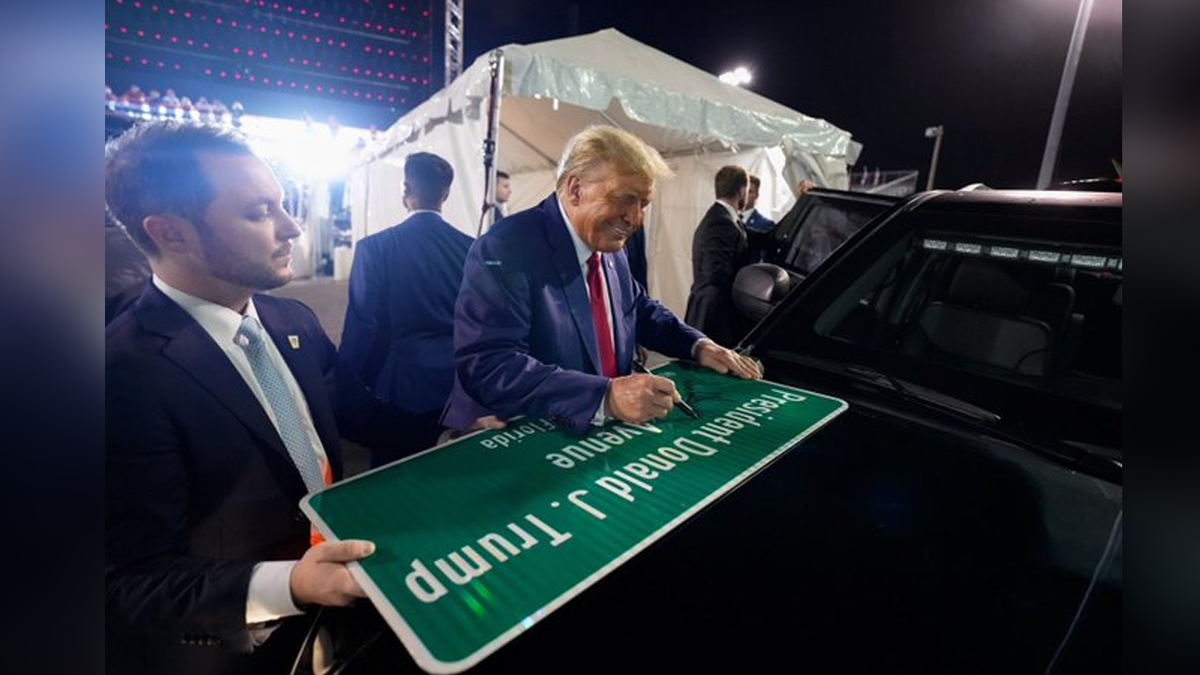
President-elect Trump was honored on Tuesday with a street renamed after him in Miami-Dade County, Florida. (X/@KMCabreraFL)
Cabrera won his county election two years ago following an endorsement by Trump.
He also served as the Florida state director for Trump’s 2020 campaign and was a member of the RNC Platform Committee.
-
/cdn.vox-cdn.com/uploads/chorus_asset/file/24924653/236780_Google_AntiTrust_Trial_Custom_Art_CVirginia__0003_1.png)
/cdn.vox-cdn.com/uploads/chorus_asset/file/24924653/236780_Google_AntiTrust_Trial_Custom_Art_CVirginia__0003_1.png) Technology5 days ago
Technology5 days agoGoogle’s counteroffer to the government trying to break it up is unbundling Android apps
-

 News6 days ago
News6 days agoNovo Nordisk shares tumble as weight-loss drug trial data disappoints
-

 Politics6 days ago
Politics6 days agoIllegal immigrant sexually abused child in the U.S. after being removed from the country five times
-

 Entertainment7 days ago
Entertainment7 days ago'It's a little holiday gift': Inside the Weeknd's free Santa Monica show for his biggest fans
-

 Lifestyle6 days ago
Lifestyle6 days agoThink you can't dance? Get up and try these tips in our comic. We dare you!
-

 Technology1 week ago
Technology1 week agoFox News AI Newsletter: OpenAI responds to Elon Musk's lawsuit
-
/cdn.vox-cdn.com/uploads/chorus_asset/file/25672934/Metaphor_Key_Art_Horizontal.png)
/cdn.vox-cdn.com/uploads/chorus_asset/file/25672934/Metaphor_Key_Art_Horizontal.png) Technology2 days ago
Technology2 days agoThere’s a reason Metaphor: ReFantanzio’s battle music sounds as cool as it does
-

 News3 days ago
News3 days agoFrance’s new premier selects Eric Lombard as finance minister

